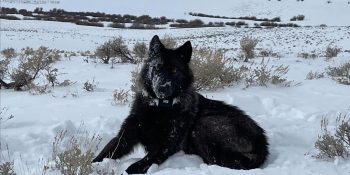A photo of 2202, the first gray wolf born and collared in Colorado. The female pup was fitted with a GPS collar in North Park on Feb. 9.
Image: CPW/Eric Odell
WALDEN, Colo. – Colorado Parks and Wildlife placed a GPS collar on a female wolf pup in North Park, Colorado, on Wednesday, Feb. 9. The collared pup will be identified as 2202. The first two numbers (22) indicate the year the animal was captured. The second set of numbers inform biologists of the wolf’s gender (males will have odd numbers, females will have even) and the order in which it was collared.
The pup is one of six produced by female wolf F1084 and male wolf 2101 in 2021, meaning the newly collared pup is one of eight wolves in the North Park area. F1084 is known to have migrated to Colorado from the Snake River Pack in Wyoming from a previously-fitted collar. That collar had stopped transmitting, leading to the decision to fit a GPS collar onto another member of the pack.
“The second GPS collar in this pack will allow our biologists and wildlife managers to learn more about the behavior of these naturally migrating wolves,” said CPW Director Dan Prenzlow.
During the collaring effort, a CPW-contracted company safely darted the animal with a tranquilizer from a helicopter, allowing the collar to be fitted by field staff on the ground. 2202 is the first gray wolf born and collared in Colorado.
“The wolf pup was given a health exam during the collaring process and appears to be in good health,” said CPW Terrestrial Section Manager Brian Dreher.
It is worth noting that, while collars provide valuable information, they only provide a snapshot and are not monitored in real time. The primary tools used by wildlife officers are field observations of physical evidence such as wolf prints and scat during field investigations to verify the presence of wolves on the landscape.
CPW also encourages the public to use its wolf sighting form if they see a suspected wolf. Any personal observations, photos or videos taken can help inform CPW staff and fill in the gaps as to wolf activity in the state.
Gray Wolves remain a State Endangered species, and wolves may not be taken for any reason other than human self-defense. Illegal take of a wolf may result in a combination of penalties, including fines of up to $100,000, a year of jail time, and a lifetime loss of hunting license privileges.

Leave a Reply